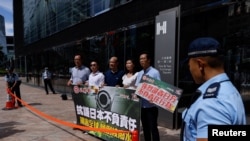On August 24, Japan started releasing treated radioactive water from the destroyed Fukushima nuclear plant into the Pacific Ocean. China criticized Japan’s action as selfish and irresponsible and banned all Japanese seafood.
Since then, there’s been a wave of harassment and vitriol directed at Japanese citizens in China, prompting Tokyo to summon the Chinese ambassador and demand that Japanese citizens in China be safeguarded.
On August 30, China’s state-run Global Times newspaper weighed in on the issue.
“Japan has primarily focused its efforts on sensationalizing the issue of ‘safety of Japanese individuals in China.’ … This is aimed at shifting the international spotlight away from the issue of nuclear pollution into the sea. ... This is about Japan committing a harmful act against all of humanity," the editorial stated.
That is misleading.
The release of diluted radioactive water has indeed led to acts of anti-Japanese harassment in China, including crank phone calls and stone throwing that targeted Japanese schools. Contrary to the Global Times’ claim, the safety of Japanese citizens living in China is a valid concern.
According to Japan’s NHK public broadcaster, on August 24, local residents in Qingdao, a city in China’s eastern Shandong province, hurled stones into a Japanese school. The next day, eggs were thrown into a Japanese school in Suzhou, a city in China’s eastern Jiangsu Province. Officials at a Japanese school in Shanghai said they received crank phone calls about the Fukushima wastewater release.
A Japanese restaurant in the southern Chinese city of Guangzhou said that a Chinese citizen threatened to report it to the authorities if it was using “Japanese-made ingredients.”
Authorities in Guangzhou reportedly investigated another Japanese restaurant without prior notice to see if it was using Japanese seafood.
Kyodo news reported that the Japanese Embassy and consulates in China have strengthened security since the Fukushima wastewater release.
Meanwhile, businesses in Fukushima have been swamped with nuisance calls from Chinese telephone numbers, according to a Facebook post by Fukushima’s mayor, Hiroshi Kohata.
Criticism of Japan is being allowed and even encouraged on Weibo, China’s tightly controlled microblogging website.
“Japan is the sinner of the world,” read one post.
“Let’s pray for the eruption of Mount Fuji, let’s pray for Tsunami, typhoon and earthquake … and the end of Japan,” another stated.
A third said: “Let’s close all Japanese schools in China and forever ban their products!”
Against this backdrop, Japan’s Foreign Ministry issued a travel advisory on August 27, urging Japanese citizens in China to exercise extra caution and “not talk loudly in Japanese to avoid attention.”
On August 28, Japanese Prime Minister Fumio Kishida asked China to urge its citizens to act “calmly and responsibly” and halt acts of harassment, including stone throwing at Japanese schools and diplomatic facilities, and crank calls.
Is the water safe?
The Global Times wrote in its editorial that Tokyo was “committing a harmful act against all of humanity” discharging treated radioactive water into the ocean.
Yet scientific studies suggest the release of diluted nuclear wastewater will have a negligible effect on the oceanic environment.
On March 11, 2011, a magnitude 9.0 earthquake caused three reactors at Japan’s Fukushima nuclear power plant to melt down.
Japanese authorities were forced to use a large quantity of water to cool down the damaged reactors and prevent the debris from overheating and causing further damage.
That water was subsequently stored in huge tanks at the plant. Currently, 1.3 million tons of radioactive water, enough to fill about 500 Olympic-size swimming pools, are being stored in 1,000 tanks.
With storage space running out, the Japanese government examined five options over a five-year period. In 2020, it concluded that the cheapest and fastest option would be to release the water into the sea after thoroughly diluting the contaminated water.
Tokyo Electric Power Company, which oversees the decommissioning process, is running the contaminated water through a complex chain of filters called the “Advanced Liquid Processing System” (ALPS).
On August 24, the International Atomic Energy Agency (IAEA) announced that it is providing live data from Japan on the safety level of the release, including water flow rates, radiation-monitoring data and the concentration of tritium after filtration.
According to the IAEA, the ALPS treatment captures 62 kinds of radionuclides, but not tritium, a radioactive isotope that’s extremely difficult to remove from the water.
Tritium has a half-life of 12.3 years, meaning 100 years have to pass before the radioactivity becomes negligible.
According to the IAEA, tritium emits weak beta-particles, and “may present a radiation hazard if inhaled or ingested but is only harmful to humans in very large doses.”
Scientists also noted that radiation is naturally common in the atmosphere. For example, around 8.4 kilograms of tritium are already in the Pacific Ocean.
By comparison, the Fukushima wastewater contains a total of three grams of tritium.
In addition, Japan is not releasing the treated radioactive water all at once. The process will take up to 30 years, and only a tiny amount of tritium, 0.06 grams, is scheduled to be released each year.
“Compared with the radioactivity already present in the Pacific, the planned annual release is a literal drop in the ocean,” three Australian scientists wrote in a joint report.






